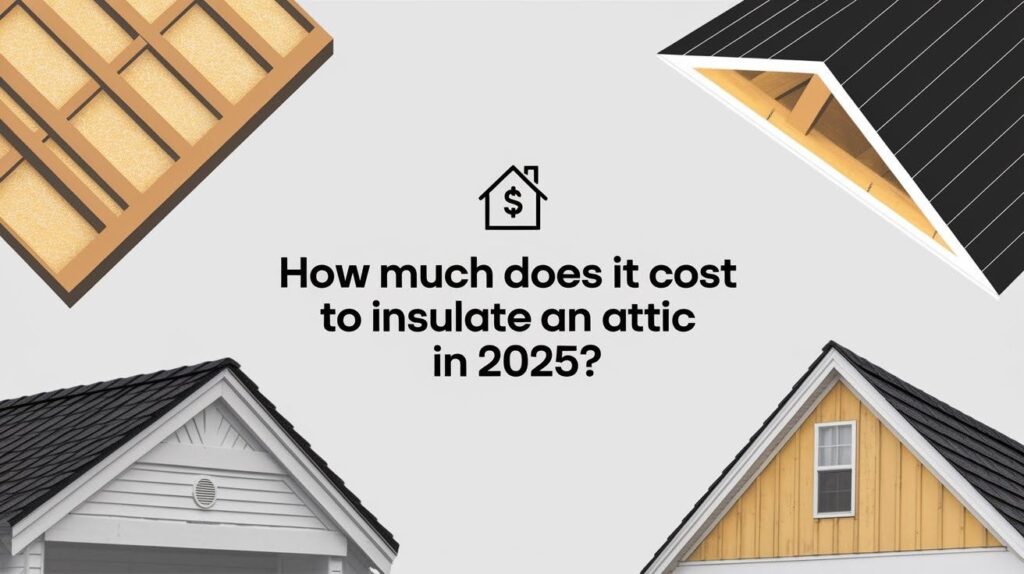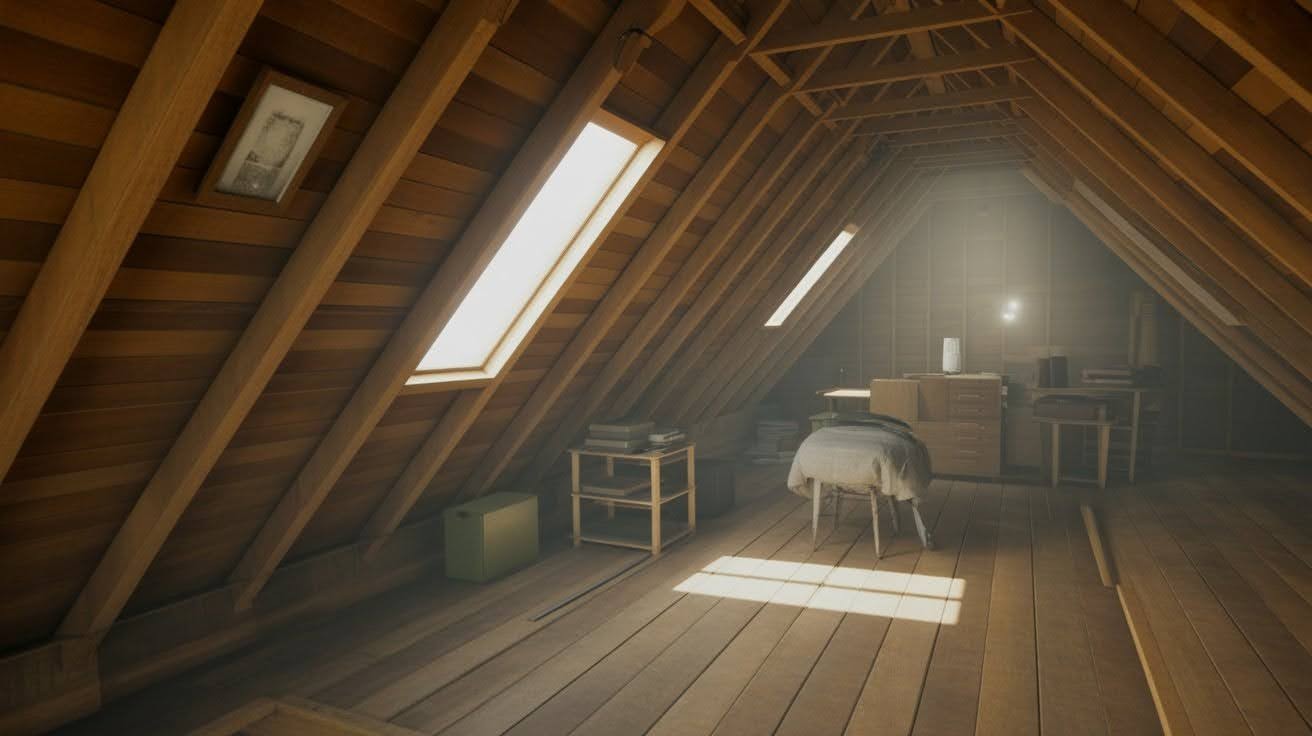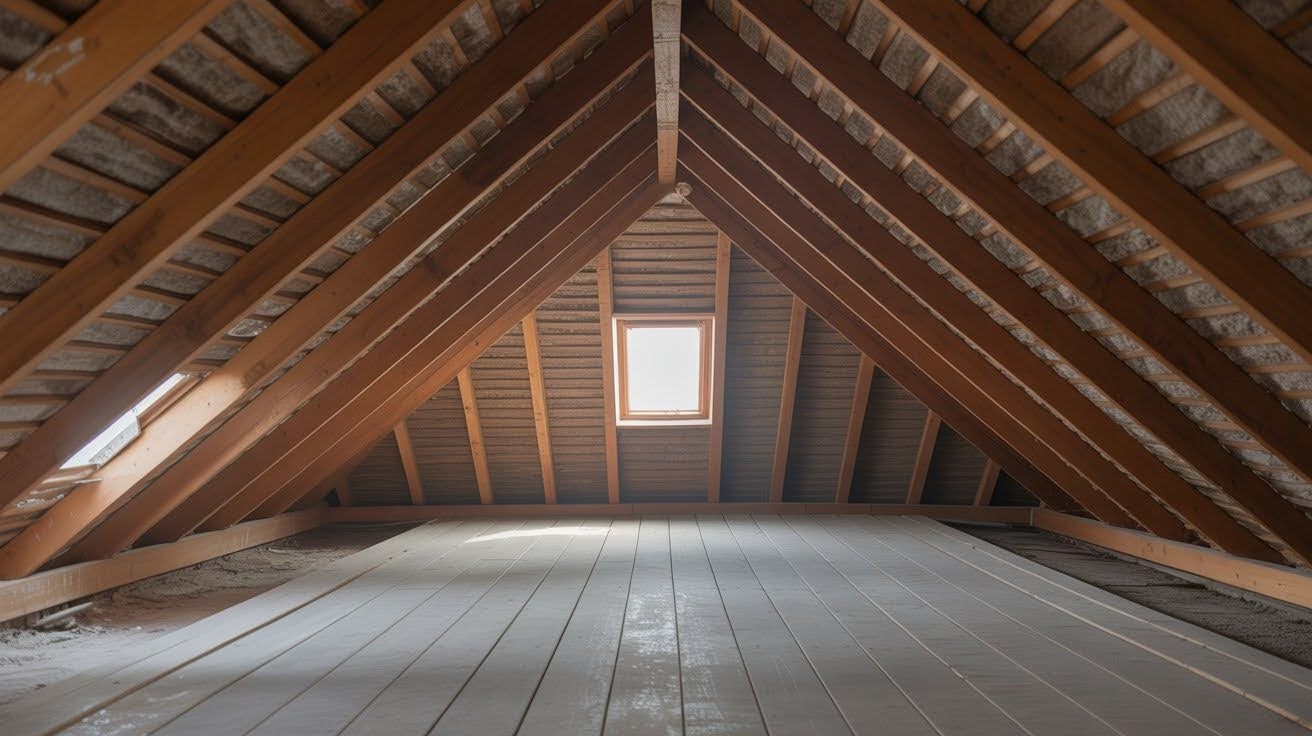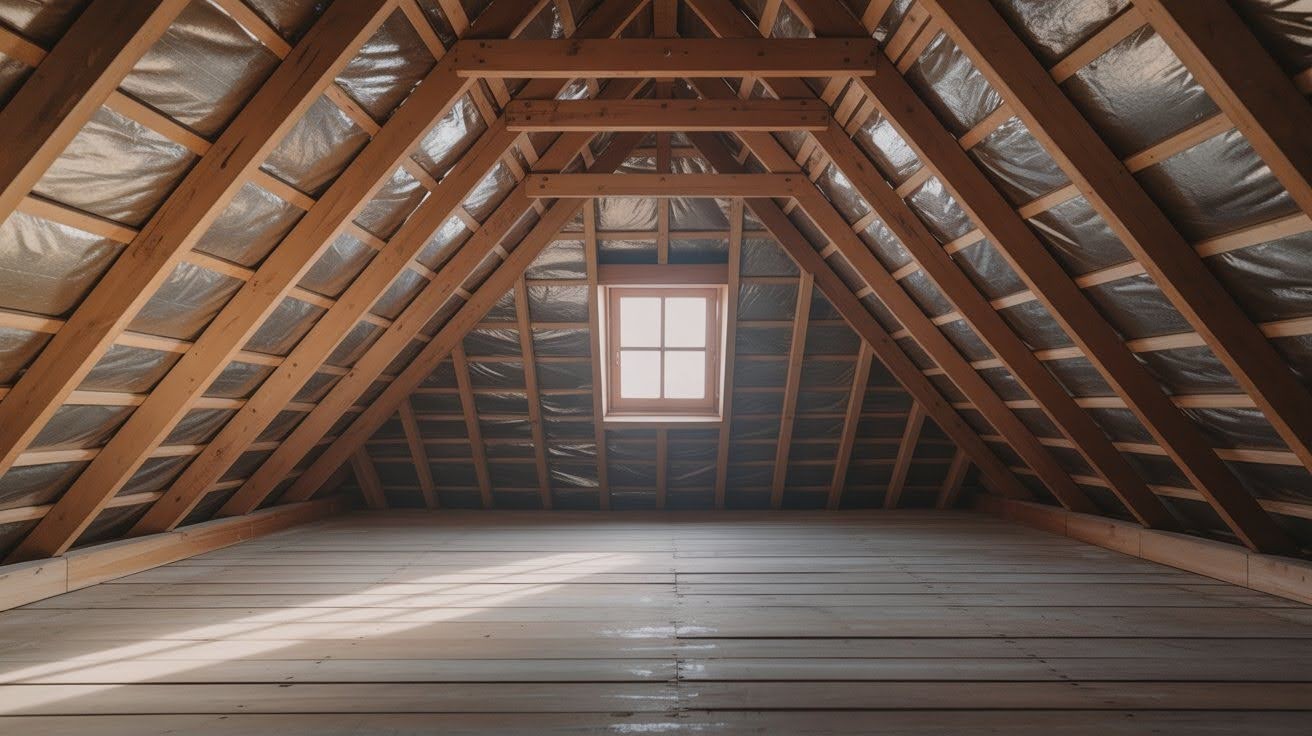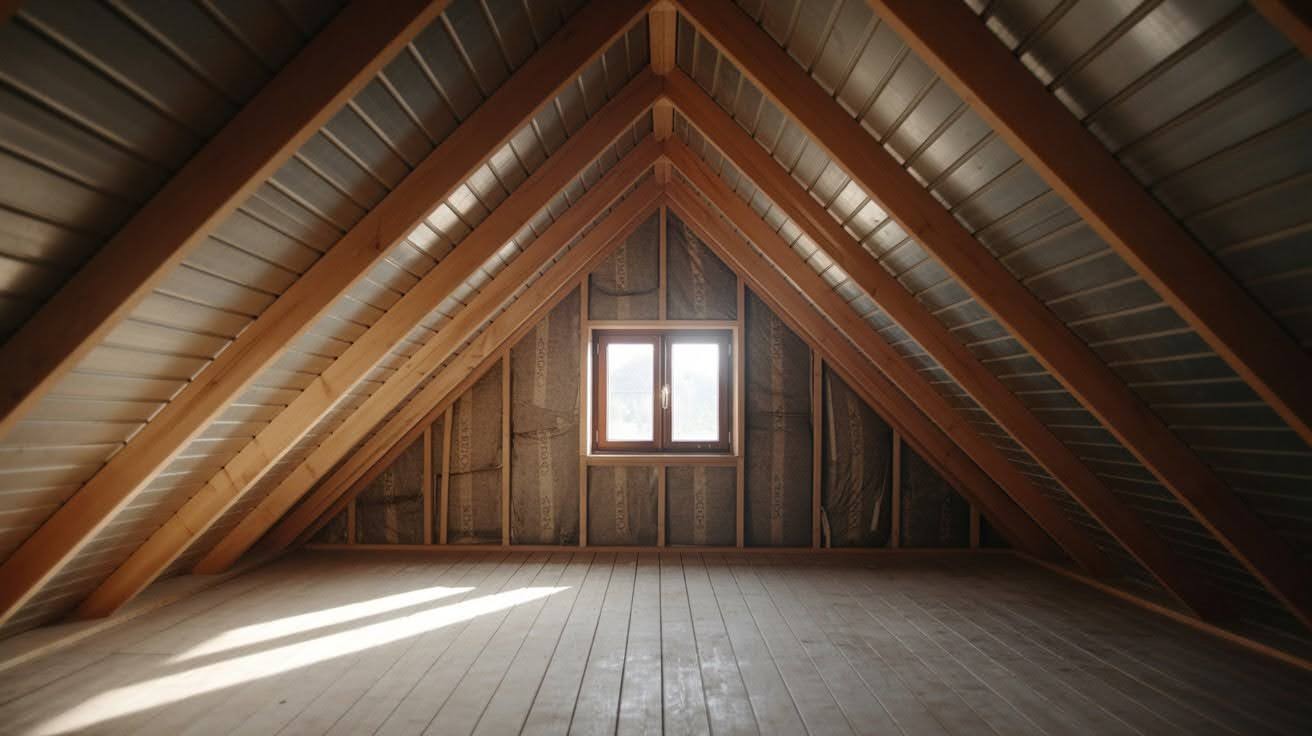Attic insulation remains one of the most cost-effective home improvements in 2025, offering significant returns on investment through reduced energy bills and improved comfort.
Proper attic insulation creates a thermal barrier that prevents heated and cooled air from escaping through your roof, making your HVAC system work more efficiently year-round.
The key benefits extend beyond simple energy savings to include enhanced indoor comfort, better temperature consistency throughout your home, and improved indoor air quality by reducing drafts and moisture issues.
According to industry data, the average homeowner can expect to save between 11% and 20% on their annual energy costs after installing quality attic insulation.
With rising energy prices and increased focus on home efficiency, investing in attic insulation provides both immediate comfort improvements and long-term financial benefits.
Average Cost of Attic Insulation in 2025
Current pricing breakdown for attic insulation projects, including national averages, typical cost ranges, and per-square-foot installation rates in 2025.
National Cost Overview
Homeowners can expect to pay an average of $2,380 for attic insulation in 2025, with most projects falling within the typical range of $1,680 to $3,125.
Budget-conscious homeowners can find low-end options starting at $800 for basic reflective insulation systems, while premium installations using structural insulated panels (SIPs) can reach $7,460 for comprehensive coverage.
These costs reflect current material prices, labor rates, and regional variations across the United States, providing a realistic baseline for planning your insulation project.
Cost Per Square Foot
Professional installation costs typically range from $1 to $6 per square foot, depending on the insulation type, accessibility, and local labor rates.
Reflective insulation offers the most budget-friendly option at $0.50 to $1.50 per square foot, making it attractive for basic applications.
Structural insulated panels represent the premium end of the market at $4 to $7 per square foot, but provide superior performance and long-term value for homeowners seeking maximum efficiency.
Attic Insulation Cost by Size
| Attic Size | Cost Range |
| 500 sq. ft. | $530 – $3,000 |
| 750 sq. ft. | $795 – $4,500 |
| 1,000 sq. ft. | $1,060 – $6,000 |
| 1,200 sq. ft. | $1,375 – $7,000 |
| 1,500 sq. ft. | $1,590 – $9,000 |
Cost by Insulation Type
Detailed pricing breakdown for different insulation materials, from budget-friendly reflective options to premium spray foam and structural panel systems.
1. Reflective Insulation
Cost ranges from $0.50 to $1.50 per square foot, making it the most budget-friendly option available.
This type works best in warm climates where reflecting heat away from living spaces is the primary concern, offering effective radiant heat protection.
2. Blown-In Insulation
Priced between $0.83 and $3.60 per square foot, blown-in insulation uses materials like fiberglass, cellulose, or rock wool.
This method provides excellent coverage around obstacles and tight spaces, with relatively fast installation times compared to other methods.
3. Batt Insulation
Costs typically range from $2 to $4 per square foot for these pre-cut panels that work best in wide, open attic spaces.
Batt insulation offers straightforward installation and consistent R-values, making it popular for standard attic configurations with regular joist spacing.
4. Loose-Fill Insulation
Priced at $2 to $5 per square foot, loose-fill insulation provides flexible, space-filling coverage similar to blown-in methods.
This option works well for irregular spaces and areas with numerous obstacles, conforming to various attic shapes and sizes.
5. Spray Foam Insulation
Ranging from $2 to $5 per square foot, spray foam comes in two main types: open-cell (less expensive) and closed-cell (moisture resistant).
This premium option provides excellent air sealing properties along with insulation, creating a comprehensive thermal barrier.
6. Structural Insulated Panels (SIPs)
The premium option at $4 to $7 per square foot, SIPs offer exceptional durability and energy efficiency.
These engineered panels provide superior performance and long-term value, though they require the highest upfront investment among all insulation types.
Additional expenses beyond materials that affect total project cost, including labor, removal, preparation, and air sealing services.
Additional Cost Factors
Additional expenses beyond materials that affect total project cost, including labor, removal, preparation, and air sealing services.
Labor Costs
- Professional installation labor typically costs between $0.56 and $2.75 per square foot, depending on the insulation type and project complexity
- Spray foam installation requires specialized equipment and training, commanding higher rates of $50 to $100 per hour
- Most homeowners can expect total labor costs to range from $500 to $1,500 for standard attic insulation projects
Old Insulation Removal
- Removing existing insulation adds $1 to $2 per square foot to your project cost
- This translates to $1,000 to $2,000 for a typical 1,000 square foot attic
- This step is often necessary when old insulation is damaged, contaminated, or insufficient for optimal performance
Preparation and Cleaning
- General attic cleaning services range from $100 to $300, preparing the space for proper insulation installation
- Additional costs may apply if contractors need to move stored items or clear extensive debris
- Consider cleaning your attic beforehand to minimize these expenses
Air Sealing
- Air sealing services cost between $200 and $750 and are highly recommended before installing new insulation
- This process closes gaps and cracks that allow conditioned air to escape
- Maximizes the effectiveness of your insulation investment and improves overall energy efficiency
DIY vs. Professional Installation
Comparison of DIY versus professional attic insulation installation, including cost differences, advantages, and disadvantages of each approach.
DIY Cost Overview
DIY blown-in insulation projects typically cost between $704 and $834 in total materials and equipment expenses.
This breakdown includes blower machine rental fees, cellulose or fiberglass materials, safety equipment, and basic tools needed for installation.
The significant cost savings compared to professional installation make DIY an attractive option for budget-conscious homeowners with adequate time and physical capability.
Pros and Cons
DIY Advantages
Do-it-yourself installation offers substantial cost savings compared to professional services, often reducing total project expenses by 40-60%.
Homeowners gain complete control over timing and scheduling, allowing work to proceed at their own pace without coordinating with contractor availability.
Many people also find personal satisfaction in completing a major home improvement project themselves, gaining valuable skills and knowledge about their home’s insulation system.
DIY Disadvantages
DIY installation comes with notable safety risks including potential falls, electrical hazards, and exposure to insulation materials that require proper protective equipment.
The process requires specific skills and knowledge about proper installation techniques, R-value requirements, and local building codes.
Additionally, the time-intensive nature of the project may require multiple weekends to complete properly, which can be challenging for busy homeowners.
Professional Advantages
Professional installation provides quality assurance through experienced installers who understand local building codes and industry best practices.
The faster installation timeline typically completes projects in one to two days, minimizing disruption to your household routine.
Professional services also include warranty coverage and insurance protection for both materials and workmanship, providing peace of mind for your investment.
Professional Disadvantages
The primary drawback of professional installation is higher upfront costs due to labor expenses and contractor markup on materials.
Homeowners also have less flexibility in scheduling, requiring coordination with contractor availability that may not align with personal preferences or urgent timelines.
Conclusion
Attic insulation represents a smart investment for 2025, with costs ranging from $800 for basic systems to $7,460 for premium installations.
The average project cost of $2,380 delivers substantial returns through 11-20% energy savings and improved home comfort.
Your choice between DIY and professional installation depends on budget, timeline, and skill level considerations.
Material selection significantly impacts both upfront costs and long-term performance, from budget-friendly reflective options to high-performance spray foam systems.
Additional factors like old insulation removal, air sealing, and preparation work can affect total project expenses but often prove essential for optimal results.
With rising energy costs and increased focus on home efficiency, quality attic insulation provides immediate comfort improvements and long-term financial benefits that make it one of the most worthwhile home improvements available.
Frequently Asked Questions
What is the average cost to insulate an attic in 2025?
The average cost for attic insulation in 2025 is $2,380, with most projects ranging from $1,680 to $3,125. Costs vary based on insulation type, attic size, and whether you choose DIY or professional installation.
How much can I save on energy bills with new attic insulation?
Homeowners typically save between 11% and 20% on their annual energy costs after installing quality attic insulation. These savings result from improved thermal efficiency that reduces heating and cooling system workload throughout the year.
Is DIY attic insulation worth the cost savings?
DIY installation can reduce project costs by 40-60%, with blown-in materials costing around $704-$834 total. However, consider safety risks, required skills, and time commitment before choosing DIY over professional installation.
What type of insulatēion offers the best value for money?
Blown-in insulation provides excellent value at $0.83-$3.60 per square foot, offering good coverage and reasonable installation costs. Reflective insulation is cheapest at $0.50-$1.50 per square foot but works best only in warm climates.
Should I remove old insulation before installing new material?
Removing old insulation costs $1-$2 per square foot but is often necessary when existing material is damaged or contaminated. This step ensures optimal performance from your new insulation and prevents moisture or air quality issues.

